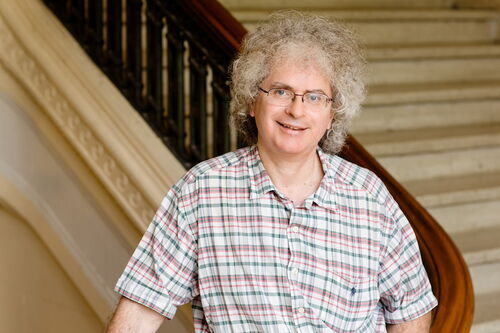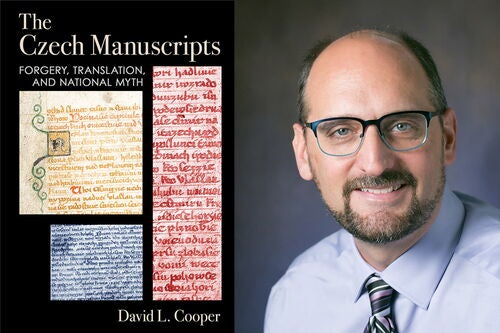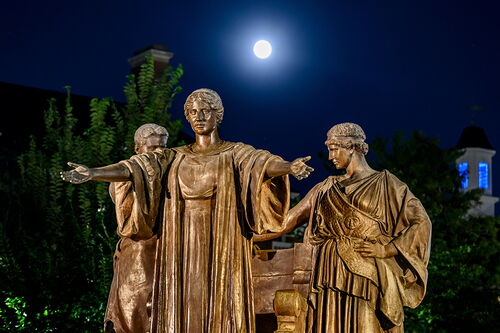U of I explores legacy of the Russian Revolution
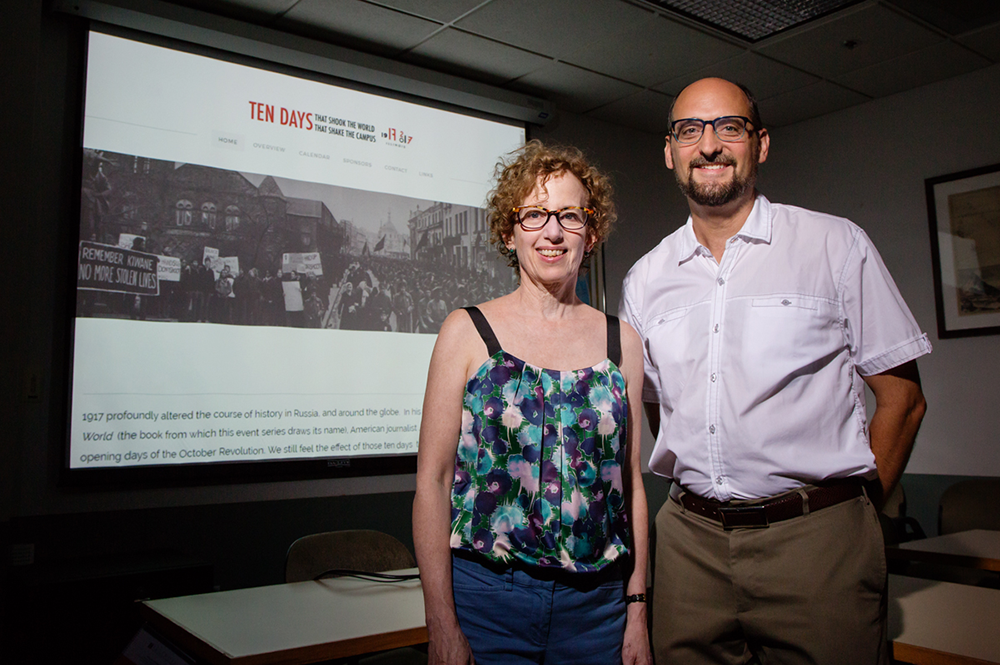
One hundred years ago, the Russian Revolution “shook the world,” in the words of a famous book.
This fall at the University of Illinois, organizers are hoping to “shake the campus,” at least a little, with a series of events reflecting on that anniversary and its legacy.
Many other schools have organized programs around the centennial, but the U of I is an obvious site as “one of the strongest centers” of Russian and Slavic studies in the country and the world, said Harriet Murav, a professor of Slavic languages and literatures, and the coordinator of the fall series.
“When people think of Slavic studies, they often think of Illinois,” Murav said. It starts with the University Library’s Slavic, East European and Eurasian Collections, some of the most extensive in the world, and extends to professorships and other programs.
“This is a place to bring people together to think not only analytically but also creatively about what the revolution, what 1917, meant in its immediate context, and what it continues to mean down to the present day,” she said.
A wide range of campus units signed up early to participate in the centennial series, said David Cooper, a professor of Slavic languages and literatures who also directed the Russian, East European and Eurasian Center until his term ended in mid-August. “They wanted to go big, to do a commemoration that sort of showed off our capacity,” he said.
The series is titled “1917: Ten days that shook the world / 2017: Ten days that shake the campus,” the first half of that referring to a book by American journalist John Reed that chronicled the opening days of the Bolshevik Revolution. It was actually the second of two revolutions in Russia that year, the first of which brought the abdication of Tsar Nicholas II.
The second half of the series’ title refers to the program of campus events, though the 10 “days” are not literal but rather groupings of activities – similar to Soviet festivals that were considered as a single day, no matter how long they lasted.
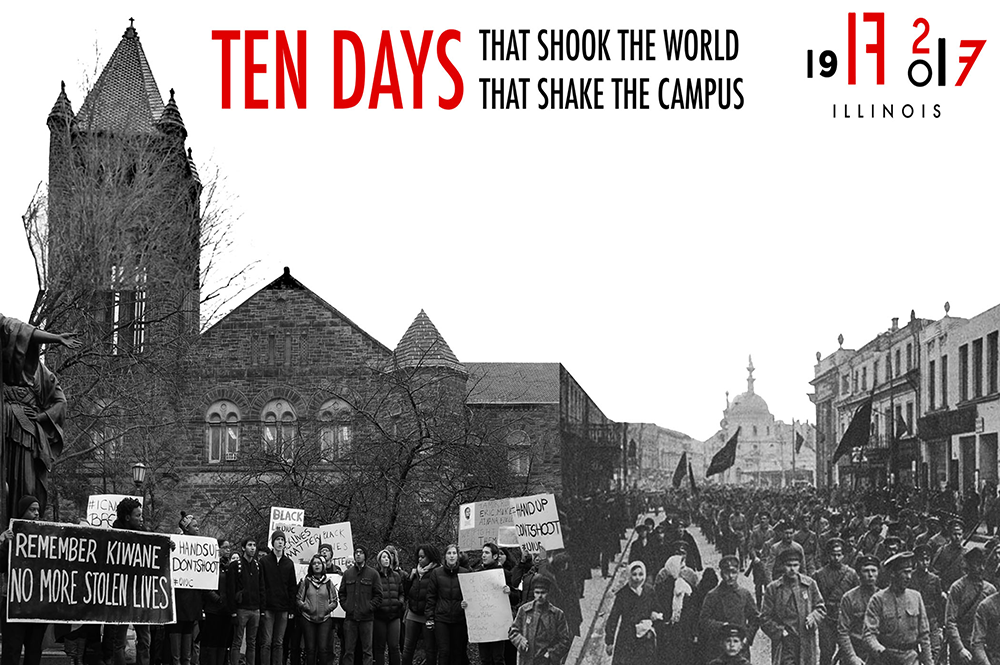
The U of I series will explore the ramifications of the revolution not only over the century since, but in connection with wide-ranging subjects and regions of the world, said Murav, who also is the editor of the prestigious Slavic Review. “That global and present-day interest is what distinguishes our program here this fall.”
The Russian Revolution remains relevant not only because it shaped so much of the 20th century, Murav said, but also because many of the issues then – related to labor and capital, economic inequality and the nature of democracy – are still being contested today. “The issues that got people out on the streets then are still getting people out on the streets,” she said.
Though a repressive and murderous regime would later result, Cooper said, “that was clearly a major distortion of what the guiding vision was early. It was really about more-democratic systems and more participation, and a more-equal and just society.”
The revolution also is relevant in the present-day tensions between the U.S. and Russia, Cooper said. “The renewal of our antagonism with Russia in the current moment is a legacy of a Cold War that’s a legacy of the ideological struggle that comes out of this revolution.”
The “Ten Days” series will explore the revolution and its aftermath through lectures, film, art, theater, poetry, music, an archival exhibit and even an innovative new undergraduate history course, which will trace a century of revolutionary movements starting with Black Lives Matter and working backward to 1917.
In all, the schedule includes about two dozen individual public activities, all free and open to the public except where noted below.
The series’ first public activities will be two exhibits opening early in the fall. "Propositions on Revolution (Slogans for a Future)” at Krannert Art Museum, 500 E. Peabody Drive, Champaign, will display works designed to elicit conversation on what revolution means in the present day. (More on this exhibit and associated talks here.)
The other exhibit, on the first floor of the Main Library, 1408 W. Gregory Drive, Urbana, will be a display of archival materials drawn from the University Library’s extensive collections related to the Russian Revolution and its legacy.
The art exhibit will officially open Aug. 31 with a reception. The library exhibit will open Sept. 1 and run through the month.
The gala opening for the “Ten Days” series will come Sept. 6 at Spurlock Museum, 600 S. Gregory St., Urbana, with a reception and lecture, “The Russian Revolution as the Mirror of Third World Aspirations,” by Vijay Prashad, the chair of South Asian history and a professor of international studies at Trinity College in Hartford, Connecticut.
Among the events following in September will be a screening of “Battleship Potemkin” on Sept. 14, as the first film in a four-film fall series, and a “Revolutionary Poetry Slam” on Sept. 18.
October events will include performances of the Tom Stoppard play “Travesties,” which explores the meaning of the social, political and cultural revolutions of 1917. These performances require purchased tickets.
November will include a symposium Nov. 2-3 keynoted by St. Petersburg, Russia, scholar Boris Kolonitski, speaking on memories of revolution in contemporary Russia, followed by presentations from U. of I. faculty and other speakers. The month also will include an exhibition of instruments used by the university’s former Russian Folk Orchestra.
December will include a faculty and community roundtable Dec. 1 and a night of Russian opera Dec. 12.
The full schedule of events can be found on the “Ten Days” website – along with links to digital resources on the revolution.






